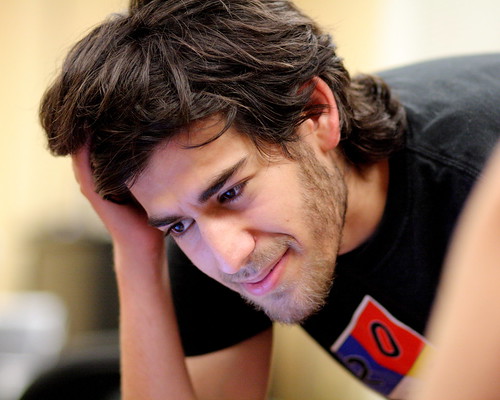I wept yesterday. I wept over the loss of a young man I never knew. I wept for his friends and his family. I wept for Quinn. For Larry. For Cory. I wept for the open Web — for the work done and left undone.
I wept for all of us.
I never met Aaron Swartz, the 26-year-old Internet activist who took his life on Friday. But I use the technologies that he helped build every day: RSS, Creative Commons licensing, Markdown, Reddit, HTTPS Everywhere.
It isn’t simply that I rely on these technologies as I work — I use these technologies to write and to share my work openly and freely online.
I was trained as a literary scholar and a folklorist. As such I’m drawn to the study of cultures, tradition, upheaval, creativity, speech.
As such I’ve spent a lot of time pouring over academic journals — articles read, articles written.
As such I don’t believe we can neatly separate form, content, and its distribution.
I left the academy. I’m a technology writer now. As such I don’t believe we can separate culture, technology, power, and politics, and I spend a lot of time thinking — particularly now that I write about education from outside education’s institutions — about how all of this affects both knowledge production and knowledge control.
The government persecuted — prosecuted/persecuted — Aaron Swartz for downloading academic journal articles from the JSTOR archives.
Aaron Swartz took his own life two years to the day after his arrest.
He was facing multiple felony charges and some 30 years in prison for this hack, this “crime” — for “stealing” when in fact, all the journal articles were still available via JSTOR; when in fact, Swartz had returned the data he’d downloaded; when in fact JSTOR had no interest in pursuing the case.
And yet the government hounded him. Hounded him. Hounded him. Hounded him. Hounded him. Hounded him. Hounded him. A young man who never sought to make money from any of his technological genius, who has always hacked for the greater public good.
To echo, Larry Lessig: Shame.
I (try to) write for the greater public good. I believe so very fiercly in the principles of freedom: free speech, free access, free association. I believe and I write and I agitate and I fight. And it’s hard — it’s hard emotionally and spiritually. It's tricky financially and ethically. So hard. So tricky. So important.
And so I rage and I cry a lot.
Aaron Swartz took his life.
He’d long suffered, as friends and family point out, from depression.
I think many of us do. Indeed I’ve often wondered — having spent so much time studying activism, being an activist myself — what the mental health profile looks like for those of us who move in radical circles.
It feels like we’re an “at-risk” population, not just legally but emotionally — and it feels too as though the government leverages this to its own sick sick ends.
(Of course it does.)
I scribbled a tear-stained note yesterday as I thought of all we’ve lost: “Revolutionaries burn at a heat that is often not sustainable for the human heart.”
We fight because we care fiercly, deeply. It hurts us to do so. It would hurt us more to do otherwise.
I scribbled: “Despair. Despair. Despair. Despair.”
Even before hearing about Aaron Swartz's suicide, this past week had already weighed heavily on me as I watched the dark cloud of various education/technology machinations — the Michelle Rhee documentary on PBS; a Gates Foundation-backed study claiming it knows what good teachers look like; RFID tracking of students; a meeting at UCLA of various university faculty, online education providers, politicians and power-brokers; CES-related gadget fetishism, with bonus tech-blogger churnalism; and the list goes on and on and on.
It depresses the hell out of me.
It spurs me on.
More scribbles: “depair. anger. frustration. helplessness. sadness. rage. rage. rage against the machine. the machine. the machine.”
Said Mario Savo: “There’s a time when the operation of the machine becomes so odious, makes you so sick at heart, that you can’t take part. You can’t even passively take part. And you’ve got to put your bodies upon the gears and upon the wheels…upon the levers, upon all the apparatus, and you’ve got to make it stop. And you’ve got to indicate to the people who run it, to the people who own it, that unless you’re free, the machine will be prevented from working at all!”
Who will stop the machine? Who will hack the machine?
Thank you, Aaron Swartz. Thank you for everything you built. Thank you for everything you hacked. Thank you for everything you stood for. Thank you for helping stop SOPA. Thank you for Demand Progress. Thank you for Creative Commons. Thank you for RSS. Thank you for Markdown. Thank you for the Internet Archive’s Open Library. Thank you for opening data, opening research, opening access. Thank you for the code, the speech, the agitation.
Thank you. Thank you. Thank you.
I'm sorry. I'm sorry. I'm sorry.
We have lost our hero, our gift, our Aaron Swartz. But we cannot give up our fight.
"Aaron dead," tweeted Sir Tim Berners-Lee, the creator of the World Wide Web. "World wanderers, we have lost a wise elder. Hackers for right, we are one down. Parents all, we have lost a child. Let us weep."
And we weep.
And we fight.
Photo credits: Sage Ross
